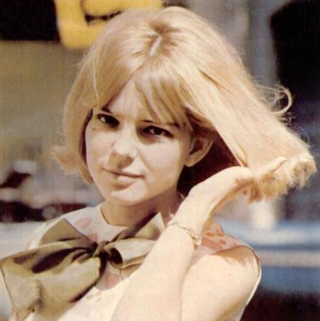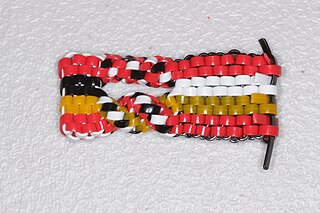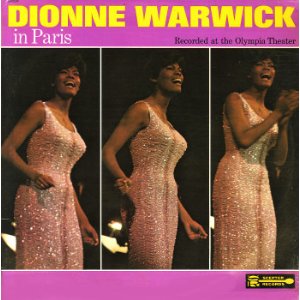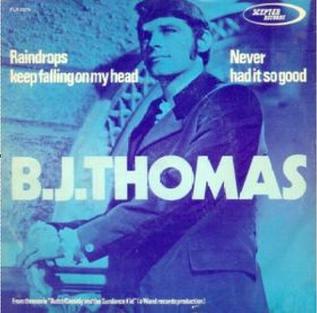Related Research Articles

In popular music, a cover version, cover song, remake, revival, or simply cover, is a new performance or recording by a musician other than the original performer or composer of the song. Originally, it referred to a version of a song released around the same time as the original in order to compete with it. Now, it refers to any subsequent version performed after the original.

Isabelle Geneviève Marie Anne Gall, known professionally as France Gall, was a French yé-yé singer. In 1965, aged 17, she won the Eurovision Song Contest for Luxembourg. Between 1973 and 1992, she collaborated with singer-songwriter Michel Berger.
Abel Meeropol was an American songwriter and poet whose works were published under his pseudonym, Lewis Allan. He wrote the poem "Strange Fruit" (1937), which was recorded by Billie Holiday. Meeropol was a member of the American Communist Party from 1932 to 1947.

"Strange Fruit" is a song written and composed by Abel Meeropol and recorded by Billie Holiday in 1939. The lyrics were drawn from a poem by Meeropol published in 1937. The song protests the lynching of Black Americans with lyrics that compare the victims to the fruit of trees. Such lynchings had reached a peak in the Southern United States at the turn of the 20th century and the great majority of victims were black. The song has been called "a declaration" and "the beginning of the civil rights movement".

The House I Live In is a ten-minute short film written by Albert Maltz, produced by Frank Ross and Mervyn LeRoy, and starring Frank Sinatra. Made to oppose anti-Semitism at the end of World War II, it received an Honorary Academy Award and a special Golden Globe Award in 1946.

Alexandre "Sacha" Distel was a French singer, guitarist, songwriter and actor who had hits with a cover version of "Raindrops Keep Falling on My Head" in 1970, which reached No 10 in the UK Charts, "Scoubidou", and "The Good Life". He was made Chevalier (Knight) of the Légion d'honneur in 1997. He had also scored a hit as a songwriter when Tony Bennett recorded Sacha's song for The Good Life in 1963. It peaked at #18 on Billboard's Hot 100 chart and Top 10 on the Easy Listening chart.

Scoubidou is material used in knotting craft. It originated in France, where it became a fad in the late 1950s and has remained popular. It is named after the 1958 song of the same name by the French singer Sacha Distel.

"Where Do You Go To?" is a song by the British singer-songwriter Peter Sarstedt. Its recording was produced by Ray Singer, engineered by John Mackswith at Lansdowne Recording Studios and released in 1969. The music has been described as "a faux European waltz tune," and the arrangement is a very simple one of strummed acoustic guitar and bass guitar, with brief bursts of French-style accordion at the start and the end. The arranger and conductor was Ian Green.

"Strangers in the Night" is a song composed by Bert Kaempfert with English lyrics by Charles Singleton and Eddie Snyder. Kaempfert originally used it under the title "Beddy Bye" as part of the instrumental score for the movie A Man Could Get Killed. The song was made famous in 1966 by Frank Sinatra, although it was initially given to Melina Mercouri, who thought that a man's vocals would better suit the melody and therefore declined to sing it.
"Everybody Loves a Lover" is a popular song which was a hit single for Doris Day in 1958. Its lyricist, Richard Adler, and its composer, Robert Allen, were both best known for collaborations with other partners. The music Allen composed, aside from this song, was usually for collaborations with Al Stillman, and Adler wrote the lyrics after the 1955 death of his usual composing partner, Jerry Ross.

"Those Were the Days" is a song credited to Gene Raskin, who put a new English lyric to the Russian romance song "Дорогой длинною", composed by Boris Fomin (1900–1948) with words by the poet Konstantin Podrevsky. It deals with reminiscence upon youth and romantic idealism. It also deals with tavern activities, which include drinking, singing and dancing.
"Maladie d'Amour" is a popular folk tune of the French West Indies recorded for the first time in 1931 by Léona Gabriel but popularised in the arrangement by Henri Salvador published in 1949. The published lyrics of Marc Lanjean begin: "Maladie d’amour,/ Maladie des amoureux / Si tu n’aimes que moi / Reste tout près de moi". However Salvador himself often sang the song in French Creole with the lyrics "Maladi damour, Maladi dé zamoureu, Chacha si’w enmen-mwen, Wa maché dèyè-mwen", a tribute to a chacha, meaning an older woman sweet on a younger man.
Maritie and GilbertCarpentier, a married couple, were artistic producers of very popular variety TV and radio shows in France and in many French-speaking countries, from the 1950s to the 1990s.

Dionne Warwick in Paris is Dionne Warwick's sixth album, and was released on April 14, 1966 on Scepter Records. It was recorded during Warwick's five-week engagement at the Paris Olympia in January 1966 and was released shortly after the tour was completed. The LP was issued as number 534 in the Scepter Catalog. The liner of this LP is pink with three pictures of Warwick side-by-side, not unlike the Make Way for Dionne Warwick album two years earlier.
"Shame and Scandal in the Family", also known as "Shame & Scandal" for short, is a song written by calypso singer Sir Lancelot for the movie I Walked with a Zombie in 1943 and originally titled "Fort Holland Calypso Song". Sir Lancelot issued his recording of it in the late 1940s. The Sir Lancelot version was covered by folksingers Odetta and Burl Ives. In 1962, Trinidadian calypsonian Lord Melody wrote new lyrics for the verses while keeping the melody and the chorus. The Historical Museum of Southern Florida said of Lord Melody's version that "No calypso has been more extensively recorded".
"The Good Life" is a song by Sacha Distel with French lyrics by Jean Broussolle, published in 1962. It was featured in the movie The Seven Deadly Sins.

"Message to Michael" is a song written by Burt Bacharach and Hal David, that has been a hit for several different artists under several different titles. The song was first recorded as "Message to Martha" by Jerry Butler in 1962. In 1964, singer Lou Johnson had a minor US hit with the song, with the title "Kentucky Bluebird". British singer Adam Faith also recorded the song as "A Message to Martha " in 1965, and had a substantial hit with it in the UK, reaching No. 12. Exactly the same recording was issued in Australia as "Message to Martha", where it was a No. 15 hit for Faith. In the United States, Dionne Warwick's version, titled "Message to Michael", was a top ten hit there in 1966.
"Won't Somebody Dance with Me" is a song written by Lynsey de Paul in 1973, which was awarded an Ivor Novello Award in 1974. Her original version of the ballad made the UK, Irish and Dutch Top 20s, and the song was featured in Michael Winner's remake of the film The Big Sleep, The Muppet Show, and the 1970s version of the New Mickey Mouse Club.
Jean Joseph Kluger is a Belgian record producer, music publisher and composer.

"Raindrops Keep Fallin' on My Head" is a song written by Burt Bacharach and Hal David for the 1969 film Butch Cassidy and the Sundance Kid. The uplifting lyrics describe somebody who overcomes his troubles and worries by realizing that "it won't be long till happiness steps up to greet me."
References
- ↑ Distel, Sacha; Allan, Lewis (1959). Scoubidou. OCLC 499093809.
- ↑ Meeropol, Robert (2003). An Execution in the family. One Son's Journey . St. Martin's Griffin. pp. 47–48. ISBN 978-0-312-30637-3. OCLC 51647500.
- ↑ "RFI - Chanson française - La disparition de Sacha Distel". 1.rfi.fr (in French). Retrieved 2018-04-06.